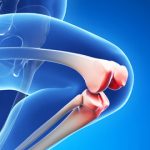In a recent study, tanezumab proved safe and effective in the treatment of knee and hip osteoarthritis…


In a recent study, tanezumab proved safe and effective in the treatment of knee and hip osteoarthritis…

SM04690, an intra-articular injection for knee OA, will soon enter phase 3 trials to assess its effects on pain, joint function and disease…
Carolyn Crist |
(Reuters Health)—Patients with knee osteoarthritis (OA) can add hip-strengthening exercises to their workout to improve the ability to walk and maybe reduce pain, according to a research review. Based on pooled data from eight clinical trials with a total of 340 patients, hip strengthening exercises involving weights or elastic bands would help the most, the…
Obesity is a well-known risk factor for knee osteoarthritis (OA), but data regarding the association of body composition (fat and muscle mass) with the risk of knee OA are lacking. Thus, it is not clear whether the effects of BMI, typically interpreted as effects of obesity, are truly due to excess adiposity rather than to overall loading due to the combined weight of body mass. Misra et al. undertook this study to examine the longitudinal association of body composition categories based on fat and muscle mass with the risk of incident knee OA…

In a recent Phase 2 clinical trial, patient-perceived pain and function measures improved with SM04690, an injectable, disease-modifying osteoarthritis treatment currently in development…
Take the challenge. CPT: 20611-LT, J7325-EJ ICD-10: M17.12, E66.01, Z68.41 Coding/Billing Rationale No evaluation and management (E/M) code was added because there was no significant and/or separate identifiable reason for an E/M service to be billed with this scheduled visit for her series of injections. The joint injection was billed with ultrasound guidance due to…
A 68-year-old female Medicare patient with a diagnosis of primary osteoarthritis of the left knee returns to a practice for her third injection in a series of knee injections. She reports being able to resume her after-dinner walks, which last for 30–40 minutes at least twice weekly. She denies fevers or any rashes. She has…
Arthritis Care & Research |
Obesity is a modifiable risk factor for many patients with knee osteoarthritis (OA), and the National Institutes of Health recommend an initial weight loss goal of 10%. But how does losing more weight affect knee OA patients? In a new study, researchers compared the outcomes of knee OA patients who lost more and less than the recommended 10% of their baseline weight, finding significant improvement in health-related quality of life and reduction in pain for patients who lost twice what’s recommended…

A recent study suggests Zilretta, an intra-articular injection for OA knee pain, may lower blood glucose levels in OA patients…

The FDA has not approved extended release Remoxy, a gel capsule formulation of oxycodone, concluding that its potential benefits do not outweigh its risks…